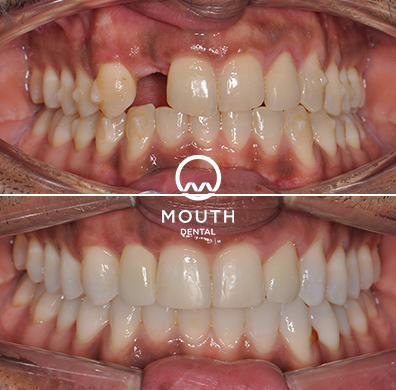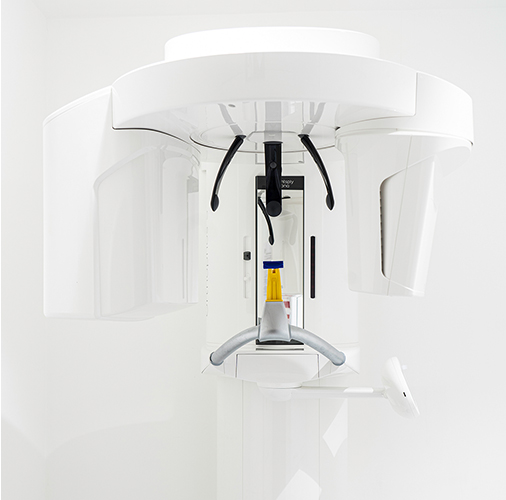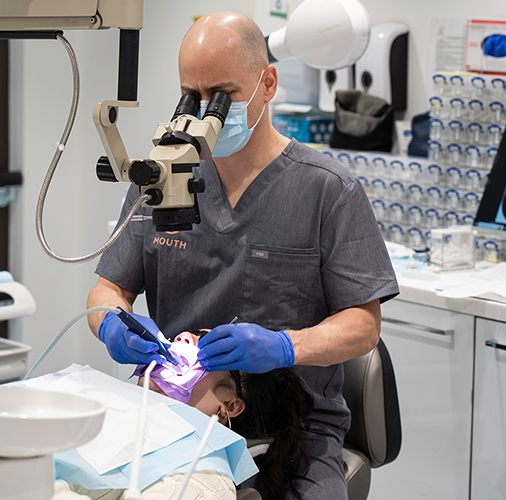REJUVENATE YOUR SMILE
With Dental Implants
From a single implant to full-mouth restorations, our friendly, professional staff will help you get the smile you deserve.
Limited Spots Available For This Month
Treatable Cases

This lovely gentleman had an accident many years ago and had root canal treatment and a post-crown on the upper right lateral incisor. This tooth, unfortunately, developed a very large abscess and was unrestorable. This tooth was removed and Invisalign was used to straighten his teeth to give the perfect space for the future implant. The missing tooth was painted in the Invisalign so that during the healing period prior to the implant, there was a tooth present in the aligner. This is a classic Mouth Dental case, using multiple specialities all under one roof.
Your implant dentist

At Mouth Dental our cutting-edge dental technology and team of experts enable us to provide super-fast dental restoration with same-day teeth implants.
At Mouth Dental our dental implants Canary Wharf treatments have helped restore the smiles of many over a range of age groups. From the initial consultation to the actual procedure our dental experts provide a committed treatment along with professional advice, ensuring you always select the right option for your dental needs.
What are dental implants?
Dental implants are a cosmetic dental procedure that help restore smiles restoring a single tooth or missing teeth. The implanted teeth or tooth are fully functioning like natural teeth as they are surgically placed in your jawbone acting as an anchor or the roots. The implant fuses with your jawbone acting thereafter as an artificial tooth root. This means they do not slip, make a noise or cause bone damage which can be the case with fixed bridgework or conventional dentures. Once fused your implant dentist then fits a custom-made crown to the implant. These titanium roots can support removable dentures, replacement crowns and bridges.
Why are dental implants inserted?
Dental implants help keep securely in place replacement teeth allowing them to function like normal teeth. That means you can chew and speak without fear of your replaced teeth shifting or falling out. It also keeps your jaw bone stimulated because without roots or implants the bone starts to deteriorate which continues over the years after losing teeth. Basically dental implants provide structure and also help prevent facial sagging that is caused by the surrounding bone loss.
There are a few dental procedures that use dental implants:
Dental crowns: This is the replacement tooth that is attached to the inserted implant. These are made from a variety of materials the most common being ceramic or porcelain adjusted to match the colour of a patient’s natural teeth.
Dental bridge: When a patient has more than one tooth missing, a dental bridge is used.
Dentures: This implant supported variety are permanently attached to strategically place dental implants thereby eliminating many of the disadvantages associated with removable dentures. This is an ideal option for someone who has lost all of their teeth.

Benefits of Dental Implants
Dental implant treatment is one of the restorative dental procedures that is always highly recommended because it helps restore smiles with long lasting results. The value of this treatment goes beyond just the aesthetic as it helps treat many issues that arise from having missing teeth.
- As dental implants are secure they allow a patient to chew their food property with confidence
- Because they act just like natural teeth they help patient’s speech which can be affected by dental gaps
- Dental implants maintain the structure of the mouth and prevent teeth surrounding the gap from bending or collapsing.
- They look just like natural teeth restoring a patient’s smile and confidence
- Dental implants are easy to care for just like natural teeth
- They are reliable and with proper care can even last a lifetime
Dental implants vs Dentures: What is the difference?
While they serve a similar purpose you will be recommended a dental bridge or dentures based on your individual oral health situation:
Dental implants are permanent replacements for missing teeth and have over the past years become a more popular option to dentures. This is because they last longer and prove to be cost effective in the long run. They also require fewer visits to dental clinics because they are easier to look after and maintain. Dental implants are perfect for people with one to a few missing teeth.
Dentures come as complete or partial and also traditional and can be fitted regardless of how much bone is missing from the jaw. They are removable prosthetic teeth that are attached to gums and are ideal for people who are missing all or many teeth together.

Dental Implants: The procedure
There are a few stages to getting dental implants and your treatment plan may vary slightly depending on the type of implant you need, how many and the on the condition of your jawbone. You will need more than one visit as after the first step there is a period during which you have to wait while your bone heals tightly around the implant. While this causes the treatment to take months to complete it creates one of the main benefits of dental implants, that of a very solid support for your new teeth.
Step 1
During this initial assessment your dental surgeon will evaluate your gums for signs of gum disease and jawbone to see if you are suitable for dental implants. Your jaw should have a certain level of healthy bone to support the implants. If you do not have enough bone material you may be recommended a bone grafting to improve the implant site or a smaller dental implant that can be supported by your existing bone.
Step 2 (for some)
There are different types of bone graft materials for you to choose from. Once the graft is placed a period of healing will be needed before the implant can be placed
Step 3
Once your bone has been sorted out your dental specialist will then place the dental implant along with a temporary crown if needed. You may need a local anaesthetic at these point. The process can take about an hour, and you will likely be prescribed an over the counter pain relief medication for you to manage the first few days after.
Step 4
It is during this period that the dental implant fuses with your bone and can take up to several months. Some however may have to wait six months or longer for their jaws to heal properly. The healing progress will be monitored throughout to schedule the final appointment.
Step 5
Once completely healed your finally appointment will include the removal of the temporary crown after which an abutment will be attached to the dental implant. Then the permanent crown will be attached. Recovery is usually within 1 -2 days unless you have many implants in which case it can take over a week or more to fully recover.
Are Dental Implants permanent?
Yes dental implants are permanent and can last a lifetime with proper care and maintenance. However, the dental crowns may need to be replaced in about 10 to 15 years depending on wear and tear.
Dental Implants aftercare and maintenance
- Oral hygiene needs to be maintained with the mouth kept as clean as possible. Do start brushing as soon as possible avoiding the tender surgical area initially but do clean once tenderness permits.
- You can use a saltwater wash to help with the healing but ensure that water is not too hot. Hold the water over the surgical area for as long as comfortable.
- If you have swelling you will be asked to place an ice pack over the area and use the recommended pain relievers
- Try and keep food away from the surgical area and rinse after eating.
- Best to stop smoking if you do at least until the wound has completely healed.
Dental implants at Mouth Dental
Our multi-clinic practice including Canary Wharf helps over 9000 private dental patients find lasting solutions for challenging or complex dental problems, treated by our professional team of established dental specialists. Backed by state of the art technology our labs have crafted lasting solutions while our renowned aftercare is appreciated by all our patients. We only use high quality dental products for all our dental treatments including our dental implants procedures. Patients can also try our platinum dental care which provides general and cosmetic dental treatments.
You can make use of our payment plans for your treatments that help spread out the cost. We also have a ‘pay as you go’ option that allows you to pay for the treatment you have carried out. Learn more about our 0% interest-free finance over 12 months and the 9.9% interest for up to five years, done in partnership with Chrysalis Finance.
Dental implants cost
Overall cost of a dental implant is generally upwards of £2550, including the initial consultation, implant placement and crown placement. This does vary according to each patient’s individual treatment requirements.
Book your virtual consultation
Begin your personalised smile transformation at Mouth Dental.
Book your free consultation with us now and let’s discuss treatment options to help you get that perfect smile!

Frequently asked questions
Can implants always be used to replace missing teeth?
It depends on the state of the bone in your jaw. Your dentist in Canary Wharf will arrange for a number of special tests to assess the amount of bone still there. If there is not enough, or if it is not healthy enough, it may not be possible to place implants without grafting bone into the area first.
Do implants hurt?
Placing the implants requires a small operation. This can be carried out under local anaesthetic with or without IV Sedation. You will not feel any pain at the time, but you may feel some discomfort during the week following the surgery which is usually due to having stitches in place and the normal healing process.
Can I have the new teeth straight away?
A degree of patience is required. The implants need to integrate with the bone after they have been placed, this takes at least 3 months. If you are having one, two or three teeth replaced you will have a temporary restoration in the meantime. If you have complete dentures, then you can wear them throughout the healing period once they have been adjusted after the surgery.
How long does treatment take?
It takes about 3-9 months from the initial assessment to the time when the artificial teeth or dentures are finally attached to the implants. A lot depends on how complicated your treatment is, your dentist will be able to give you a timetable once the surgery has been done.
Are the teeth difficult to clean?
Cleaning around the teeth attached to the implants is no more difficult than cleaning natural teeth. However you will be shown methods to clean any difficult areas should they occur.
Can I still get gum disease?
Yes if you don’t care for them well enough. If you keep them clean, and do not smoke, then you should not have any problems.
Can I take the teeth out if they are fixed to implants?
Most artificial teeth attached to implants can only be placed and removed by the dentist. However, if you have a complete set of dentures fixed to the implants by bars, then you will be able to take them out for cleaning.
Do the implants show?
Your dentist will make sure that the implants will not show during all normal movements of the mouth and lips. You will need to be able to see them so that you can clean them properly.
Do I have an implant for each missing tooth?
Not unless you are only having a single tooth replaced. Normally, five or six implants are used to replace all teeth in one jaw, as each implant can usually support two teeth. For a few missing teeth, two or three implants may be used.
What happens if they get damaged?
Implants and the teeth they support can be damaged by an accident in the same way that natural teeth can. However if the fabricated teeth are damaged and the remnants are left in the bone then they may be more difficult to remove than natural teeth would be. After healing new fabricated teeth can then be placed alongside the fragments.
What happens if the implant does not integrate with the bone?
This happens very rarely. If the implant becomes loose during the healing period or just after, then it is easily removed and healing takes place in the normal way. Once the jaw has healed, another implant can be placed there; alternatively the dentist can make a bridge, using the implanted teeth that have ‘taken’.
Fees
Implants from £1,995
